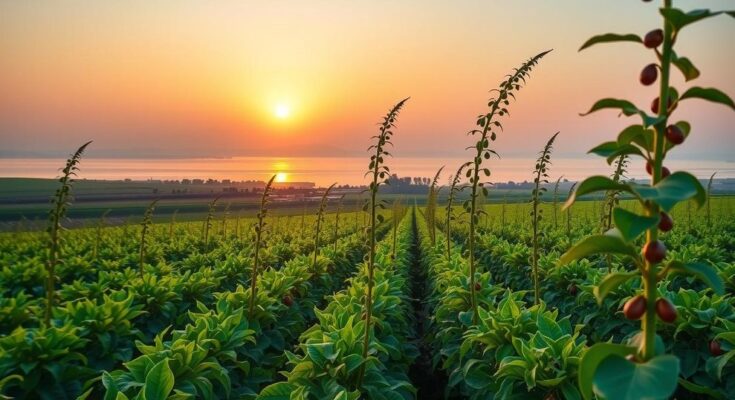Makhana, or fox nut, harvested from the Euryale Fox plant, has gained fame as a superfood, particularly among health enthusiasts. Despite Bihar producing 90% of India’s makhana, it struggles to seize the growing global market. The recent initiative of establishing a “Makhana Board” in India’s Union Budget 2025 aims to enhance production, processing, and marketing to capitalize on this demand.
India ranks seventh globally in food exports and plans to boost value-added food exports by 40% within the next few years. The organic food market, targeted for fourfold growth, also presents significant opportunities. In this context, Bihar’s focus on enhancing makhana production could yield significant economic rewards.
Mithila Makhana, a special variety from Bihar, has received a Geographical Indication (GI) tag, protecting its identity and enhancing its market appeal. This step aims to improve farmer livelihoods by preventing unauthorized exports and promoting awareness. Yet, despite this potential, Bihar’s challenges in productivity and processing remain obstacles to economic benefits.
Given the challenges of Bihar’s flood-prone terrain, makhana farming has thrived, especially with the introduction of better seed varieties. Farmers can reap threefold returns compared to rice cultivation through advanced cultivation techniques. The changing global snack market sees makhana as a healthier, gluten-free alternative, but most are still sold raw, limiting profit margins for local producers.
The global superfood market could leap from $164.38 billion in 2021 to $228.04 billion by 2026, driven by health trends. While India, a significant agricultural exporter, has not fully tapped into its superfood potential, it holds promise with makhana alongside other indigenous products.
The Makhana Board opens doors for foreign investments aiming at enhancing production and export capabilities in India’s flourishing superfood arena. Key investment areas lie in modern processing facilities, quality certification for exports, and sustainable farming practices, with potential partnerships between local producers and foreign brands.
Bihar’s makhana industry faces several hurdles: low productivity stemming from outdated farming methods, insufficient processing infrastructure leading to raw sales, and strict export standards. These issues are exacerbated by a lack of market organization and farmer awareness of available support schemes.
The Budget 2025-26 introduces a “Makhana Board” with a budget of INR 1 billion dedicated to improving production and processing. Its mission includes providing better seeds, supporting local processing units, and enhancing branding efforts to promote makhana as a premium product.
Makhana, a superfood from Bihar, faces challenges related to productivity and export markets. The Indian government’s “Makhana Board” aims to enhance production and marketing to meet growing global demand. Despite holding potential with the GI-tagged Mithila Makhana, farmers struggle with low earnings due to a lack of processing infrastructure and market inefficiencies. The future of Bihar’s makhana industry depends on the effective implementation of support initiatives and foreign investment opportunities, promising significant economic impact if successfully navigated.
The establishment of the Makhana Board brings hope for transforming Bihar’s makhana industry into a global powerhouse. Successful implementation of support systems and training for farmers will be key to enhancing productivity and profitability. With the right strategies, Bihar can significantly increase its agricultural exports, boosting both local economies and India’s position in the superfood market. However, the sustainability of this initiative hinges on effective execution and farmer engagement, promising a potentially bright future for the state’s agricultural landscape.
Original Source: www.india-briefing.com



